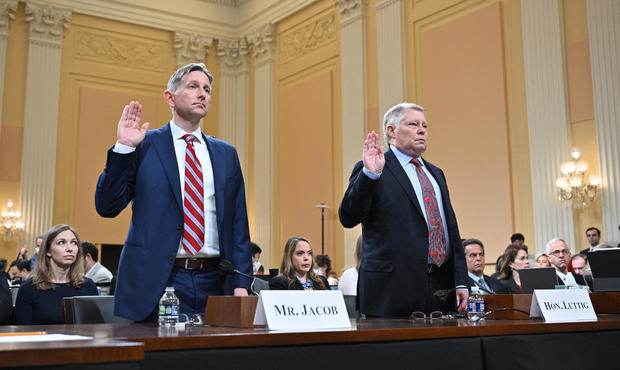Washington — The House committee investigating the Jan. 6 attack on the Capitol turned its attention to former President Donald Trump’s campaign to pressure former Vice President Mike Pence to reject electoral votes on Thursday, hearing testimony from close Pence aides who said the president’s efforts to overturn the 2020 election were nonsensical and “un-American.”
“Mike Pence said no. He resisted the pressure. He knew it was illegal, he knew it was wrong,” Committee Chairman Bennie Thompson said to open the third day of hearings examining the Capitol attack. “We are fortunate for Mr. Pence’s courage on January 6. Our democracy came dangerously close to catastrophe.”
Two Pence advisers appeared in person at Thursday’s hearing: Greg Jacob, Pence’s former counsel, and J. Michael Luttig, a highly respected conservative jurist and retired federal judge who advised Pence in the aftermath of the 2020 election. The committee also showed taped footage of interviews with Pence chief of staff Marc Short and other aides.
The testimony made clear that Pence and his closest aides repeatedly told Trump and his allies that a theory pushed by conservative lawyer John Eastman, who argued the vice president should single-handedly reject or replace slates of electors, had no basis in the Constitution or federal law.
The committee presented evidence that Eastman himself knew the plan violated the law. Nevertheless, Trump continued to pressure Pence to intervene, including in a heated phone call on the morning of the attack. Pence’s aides said the president’s insistence pushed the country to the brink of a constitutional crisis and placed the vice president at grave risk of physical harm when the mob stormed the Capitol.
MANDEL NGAN/AFP via Getty Images
Jacob told the panel that he advised Pence in December that he had “no justifiable basis to conclude” that he could unilaterally reject Electoral College votes, confirming what he said was Pence’s “first instinct.” In his role as president of the Senate, Pence presided over the joint session of Congress when it gathered to count Electoral Votes on Jan. 6, as required under the 12th Amendment and an 1887 law known as the Electoral Count Act.
“There’s just no way that the framers of the Constitution — who divided power and authority, who separated it out who had broken away from George III and declared him to be a tyrant — there was no way that they would have put in the hands of one person the authority to determine who was going to be president of the United States,” Jacob said.
Short testified that Pence told Trump he would not reject electors “many, many times” yet the president would not drop the matter. Luttig said Pence rejecting Electoral College votes “would have been tantamount to a revolution within a constitutional crisis in America.”
The committee unveiled an email Eastman sent to Rudy Giuliani seeking a pardon in the wake of the Capitol attack. Eastman invoked his Fifth Amendment right against self-incrimination more than 100 times when he met with congressional investigators.
The second half of the hearing examined the threats to Pence on the day of Jan. 6 itself, when he refused to heed Trump’s call to reject electors. The committee said Pence came within 40 feet of the angry mob as he was escorted from the Senate to a secure location, where he remained for more than four hours before the Capitol was secured and lawmakers completed the counting of electoral votes.
